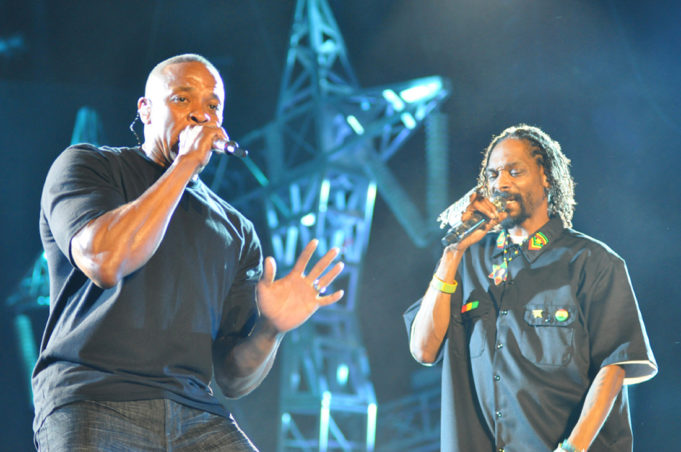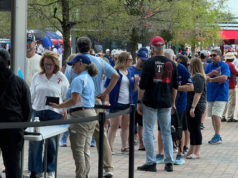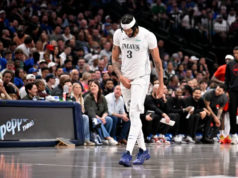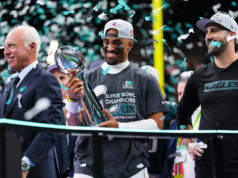Coming Up 7s
Last Sunday’s Super Bowl was one for the ages. It was thrilling! It was spectacular! It was adrenaline-pumping entertainment that had me jumping off my couch and screaming while running around my living room. Plus, there was a pretty decent football game, too.
The bring-down-the-house halftime performance by Dr. Dre, Snoop Dogg, Mary J. Blige, Eminem, Kendrick Lamar, and a shockingly swole 50 Cent was the Super Bowl’s first to feature rap artists, even though the genre has dominated album sales and pop culture in general for more than a quarter century now.
Sure, the choice inflamed the white-grievance hordes of MAGA-land — I had a family member of the elderly persuasion actually leave the room and not return until it was over — but the show was not meant for them anyway. It was a long-overdue moment of tribute to a criminally underappreciated and unfairly maligned artform delivered in front of the whole world by the very handful of creators that built the inarguable cultural empire that hip-hop represents today. It made me genuinely happy to witness those artists bask in the grandeur and celebration they so richly deserve.
Bookending the cultural-celebration-turned-culture-war was one heck of a game. While most of the viewing public (including yours truly) seemed to be practically donning tiger-striped face paint in their living rooms as they cheered on Joe Shiesty, a.k.a. second-year QB Joe Burrow, and the rest of the blue-collar, upstart Cincinnati Bengals, it was ultimately the Amazon.com of football teams that would be victorious. Cincy would hang around, keeping it close, and even taking a lead into the final three minutes, but the Rams’ stars proved too bright to overcome.
The great debate over whether L.A.’s controversial future-mortgaging team-building strategy was a sound one or not appears to have been resolved. For the moment, it appears it was. The “super team” has been an NBA championship-winning strategy for more than a decade. With a hard salary cap and the high value of draft capital for ever-churning rosters, a similar approach had never been attempted in the modern NFL. The Rams have fully sacrificed their future for an all-in, win-now approach. Because of trades for big names like cornerback Jalen Ramsey and quarterback Matthew Stafford, they won’t pick again in the first round of the draft until 2024. By then, largely because of the trade up to select now-departed QB bust Jared Goff in 2016 (he was traded this past offseason along with a couple more firsts for the aforementioned Stafford), the Rams will have not picked in the Top 32 for seven straight years.
None of that matters now they’ve won. The Rams may slog through mediocrity — especially in the highly competitive NFC West — for years to come, but they have their ring. Ironically, it was their homegrown talent that sealed the victory. If not for Super Bowl MVP wideout Cooper Kupp and still-the-best-player-in-football D tackle Aaron Donald, both L.A. draft picks, Rams GM Les Snead’s big gamble would have come up bust. Sometimes the cards just break your way. — P.H.
What the Super Bowl Means for the Cowboys
Did you like how both Super Bowl teams still had all three timeouts headed into the fourth quarter? Wasn’t it cool that every other drive wasn’t killed by a penalty? And did you see how the Rams could still play offense when their players went down with injury?
For Cowboys fans, watching this year’s Super Bowl between two well-coached teams was a soul-crushing reminder about just how far our team is from competing at a championship level. I couldn’t have been the only one with my hands on my head thinking, “Wait, how do all of their players know when to come onto the field? Why do all of the offensive linemen know when the ball is being snapped? How is it the defense isn’t getting a head start on the snap count? This isn’t football. It’s not chaotic enough.”
The thrilling, crisp game between the victorious Rams and plucky Bengals was a masterclass in discipline, creativity, and overcoming adversity: three traits the Cowboys haven’t possessed in two decades.
As Rams QB and local product Matthew Stafford began the epic drive that would ultimately clinch the game and season, I excitedly watched to see how he and that hobbled offense would finish the job.
Flash back to a few weeks ago when the Dak Prescott-led Cowboys offense shat themselves with more than two minutes to go against the 49ers, I had the opposite feeling. I was waiting to see how the Cowboys would screw it up. And they did.
If the Cowboys brass takes anything away from L.A.’s 23-20 win over Cincy, it’s that coaching matters in big games. The Cowboys haven’t had a disciplined team or a strong head coach since Bill Parcells walked away. I don’t have to remind you of how things have gone since.
It’s too easy to forget to blame owner Jerry Jones for the franchise’s many failings since he and erstwhile head honcho Jimmy Johnson ended their pissing match two decades ago, but it’s worth reminding ourselves every now and again how the Cowboys arrived at this static state of mediocrity.
Like most fans, I’ve compartmentalized the team’s woes to such a degree that I’ve completely removed Jerry from the equation. It’s like sports Stockholm Syndrome. We’ve become so accustomed to terrible decisions from the top, we try and adjust our logic to viewing those bad moves as a sunk cost. We try and figure out a way the team can win despite him.
In terms of talent, the Cowboys’ roster was right there with the Bengals and Rams. Jones deserves some credit for that. The boys in silver and blue lacked the kind of head coach who can adjust strategy on the fly, recognize and fix scheme issues throughout the week, instill discipline or enforce consequences for a lack thereof, and manage the clock at least as well as a competent Madden gamer.
I don’t even blame McCarthy for sucking. That’s what he does.
Jerry Jones hires only puppet coaches, who allow him to sit in on team meetings, hire assistant coaches, and generally dictate the culture of every season’s team. Jerry Jones blurs the chain of command and undercuts those puppets. Jerry Jones doles out awful contracts to older players that hamstring the team’s roster-building efforts. Jerry Jones is the reason this team hasn’t sniffed a Super Bowl since Jimmy’s players aged out of the league.
As we grouse about this player and that coach, let’s just try and keep in mind the only real reason this team consistently fails. I hope you enjoyed the Big Game — and seeing what football is supposed to look like. — B.J.












